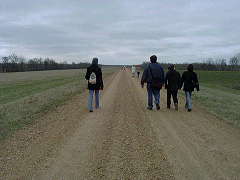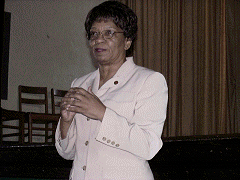








| |

Walking along the levee |
Jerome Williams:
This Morning we got on the bus and continued our tour of the Delta,
but our emphasis was on the Mississippi River and the levee system. We
eventually ended up driving on the actual levee that failed in the 1927
flood. To my surprise, our bus actually drove onto this historical site,
often referred to as "break 27". We got off the bus to receive a brief,
informative talk about the levee, along with many things that can lead to
its failure. We learned of how the levee was built, what was used to build
it, who was used to build it, and how the levee?s failure in 1927 affected
everyone in the Delta. After learning about the levee system and its
history, the group quickly realized that the bus, which had dropped us off
earlier, did not return at its expected time.
| 
The bus getting pulled back onto the road |
Ken Nadolski:
An important part of this tour
was to learn about the exploitation of black labor. The cotton economy was
based on sharecropping which kept African Americans constantly in debt. The
economic, social, and cultural aspects of sharecropping and the plantation
system were stressed. Luther also explained that the levee is one of the
largest earthworks on the face of the earth. And remember Luther's words of
wisdom: "if the water is coming up cloudy, you have a sand boil, and that means
RUN!"
| 
Shaw High School |
The Good Bus Sheri dropped us off on the levee and went to find a place to turn
around. We finished our discussion and began to wonder where-oh-where the Good
Bus could be. We entertained ourselves on the levee: some chased cows, and
others avoided cow pies. Then we began to really wonder: oh-where-oh where
could the Good Bus be? We started heading in that direction and some random
guys driving pickup trucks picked us up. When we got to the Good Bus we learned
that she was stuck on a levee. Hilarity ensued. Everyone seemed to enjoy the
fact that we were stuck on a levee, I mean really, who gets stuck on a levee
during spring break? Only Get on the Bus 2003. Eventually a giant log-loading
thing came and freed the Good Bus. The best part was when Luther then repaired
the damaged levee with his bare hands...
| 
Jesse Williams | Sam Butler:
This culture I think breeds the southern hospitality and acceptance.
In the delta, there is a high level of churchgoers and a large Jewish,
population we found out. It's the area that had nearly no Klan activity
at all, but of course you can attribute this to the fact that
plantation owners like the powerful Percy family told them they were unwelcome.
The lack of the Klan in the delta doesn't necessarily mean that there was less racism. But looking at that night in Po Monkey's
as we sat there tapping our toes inside a sharecropper's shack, I looked at
the eclectic mix of everyone present. They were from all kinds of
backgrounds and social classes, simply coming together to have a fun time.
In the air that saw sweat stained overalls mixing with neatly pressed
Armani suits, there just seemed to be a total lack of pretense. Yet at the same time this is the state that allowed for generations of
racism to be perpetuated. This seems to be a country of paradox and antithesis. There is a duel
nature in MS, just like the divisions of the juke and the Honky Tonk. This
is the state that holds the two worlds of the hills and the Delta. Keep in
mind that Tallahatchee County has two seats! |
 |   
Entertainment at Po Monkey's Juke |
|



















